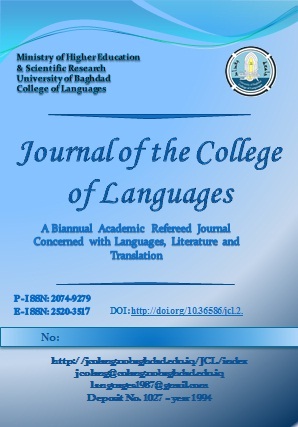Abstract
Manipulation is a discursive concept which plays a key role in political discourse by which politicians can impose some impact on their recipients through using linguistic features, most prominent of which are personal pronouns (Van Dijk, 1995). The aim of this study is to investigate how politicians utilize the personal pronouns, namely; We and I and their possessive forms as a tool of manipulating the audience\'s mind based on Van Dijk\'s \"ideological square\" which shows positive-self representation and negative-other representation (Van Dijk,1998:p.69). To this end, American President Donald Trump\'s 2020 State of the Union speech was chosen to be the data of analysis. Only (8) examples out of (226) extracts of his speech involving the use the personal pronouns along with their indications were analyzed qualitatively and quantitatively. Results reveal that Trump uses these pronouns to exercise an ideological influence on his audience, basically to present himself positively. The study concludes that Trump strategically uses personal pronouns as a functional indication of collectivity, nationalism, and direct/shared responsibility. Findings might help linguists and political analysts to understand how politicians have the ability to exploit the linguistic characteristics in their language to fulfill their ends manipulatively.
Keywords
Ideological Influence
Ideological Square concept
Manipulation
Personal Pronouns
Political Discourse
Abstract
المناورة مفهوم خطابي تؤدي دورا أساسيا في الخطاب السياسي التي بوساطتها يتمكن السياسيون من فرض نفوذ معين على متلقي الخطاب عند استعمال سمات لغوية, ومن أهمها الضمائر الشخصية (فان دايك,1995). تهدف هذه الدراسة الى استقصاء الطريقة التي يوظفها السياسيون في استعمال الضمائر الشخصية و تحديدا الضميرين ’نحن‘(WE) و ’أنا(I)‘، فضلا عن صيغ التملك التابعة لهما ، بوصفها وسيلة للمناورة تستهدف إدراك المتلقين القائمة على مفهوم المربع الإيديولوجي لفان دايك (( Ideological Square الذي يشير الى تقديم الذات تقديما ايجابيا و تقديم الآخرين تقديما سلبيا. و لتحقيق اهداف الدراسة ، اختير خطاب حالة الاتحاد State of the Union)) لعام 2020 للرئيس الامريكي دونالد ترامب ليكون مادة للتحليل. و جرى تحليل (8 )امثلة من مجموع 226 مقتطفا من خطابه الذي تضمن استعمال هذه الضمائر مع دلالاتها نوعا وكما . تظهر النتائج إن الرئيس ترامب يوظف تلك الضمائر لممارسة تأثير آيديولوجي على متلقيه وفي الاساس تقديم ذاته تقديما ايجابيا . وتخلص الدراسة الى ان ترامب يوظف الضمائر الشخصية بوصفها موشرا وظيفيا لمفهومي الروح الجماعية collectivity))أو القوميةnationalism) (، أوموشرا للمسؤولية المباشرة او المشاطرة مع الآخرين. إن نتائج الدراسة من شأنها أن تساعد اللغويين و المحللين السياسيين على فهم الكيفية التي يوظفها السياسيون في استغلال الخصائص اللغوية في لغاتهم تحقيقا لأهدافهم بطرق المناورة .
Keywords
التأثير الايدولوجي
الخطاب السياسي
الضمائر الشخصية
المناورة
مفهوم المربع الإيديولوجي
